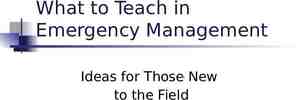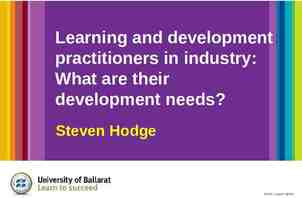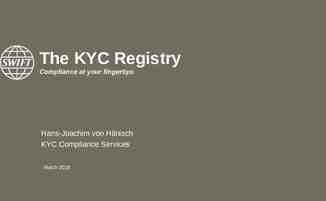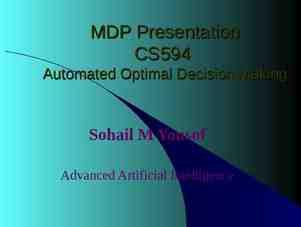The Doctor of Nursing Practice REFLECTIONS AND REFLECTIVE PRACTICE OF
43 Slides5.01 MB

The Doctor of Nursing Practice REFLECTIONS AND REFLECTIVE PRACTICE OF A DNP SCHOLAR D O N N A M . E M A N U E L E , D N P, F N P - B C , F A A N P A SS OCIATE PROFESS O R O F N URS ING DNP PROGRAM DIRECTOR W E S T E R N U N I V E R S I T Y O F H E A LT H S C I E N C E S

“There is no greater agony than bearing an untold story inside you.” Maya Angelou

DNP REFLECTIVE THINKING

Reflective Thinking Is Thinking that is purposeful and working towards a conclusion Reflection begins with an unexpected difficulty, challenge or problem (Dewey) Where the thinker examines the sources of, and evidence supporting, a set of beliefs or expectations surrounding a situation, and to search and inquire in an effort to resolve doubt (Musolino & Mostrom, 2005).

Reflective Thinking

DNP REFLECTIVE PRACTICE

What is Reflective Practice Part of a change that acknowledges the need for students to act and to think professionally as an integral part of learning throughout their courses of study, integrating theory and practice from the outset (Mann, Gordon, & MacLeod, 2009) Helps close the gap between theory and practice (Working in Partnership Programme, 2006)

Reflective Practice Donald Schon (1983) Expanded on theory of reflection Developed concept of Reflective Practice Improving clinical practice and consequently quality of care, through exploring and evaluating one’s understanding of a problem rather than simply trying to solve it (Leung, Pluye, Grad, & Weston, 2010)

DNP Scholars & Reflection “to see things from a different perspective and then gain insight that makes it an effective learning experience”(Ashby, 2006, p. 37).

Kolb’s Experiential Learning Cycle, 1984

Gibb’s Reflective Cycle, 1988

How Do You Build Your DNP Toolbox? Time Reflection & Professional Development Plan Clarification Validation Analysis Application Dissemination

Student Learner to DNP Scholar

Essential Attributes “Tools” Learn from one’s experiences Develop & maintain competence over a practice lifetime Identify your learning needs Present application of skills and competencies Mann, Gordon, & MacLeod, 2009 Professional identify development Understanding your personal values, beliefs, & attitudes within your professional culture (and the world around you) Linking new to existing knowledge Becoming more selfaware to engage in selfmonitoring and selfregulation

Where are you going? Where do you begin? Being a good DNP scholar involves more than “merely” coming up with brilliant ideas & implementing them. Most scholars spend a majority of their time reading papers, discussing ideas with colleagues, writing & revising papers, staring blankly into space -- and, of course, having brilliant ideas and implementing them.

DNP APPRECIATIVE INQUIRY Appreciative Leadership

As DNP Scholars

“Those who say it cannot be done should not interrupt those doing it.” Author unknown

DNP APPRECIATIVE LEADERSHIP

Paradigm Shift in Leadership Appreciative Leadership (AL) is “the relational capacity to mobilize creative potential and turn it into positive power—to set in motion positive ripples of confidence, energy, enthusiasm, and performance—to make a positive difference in the world.” (Whitney, 2010)

Four Formative Ideas to AL (Whitney, 2010) It involves relational It recognizes potential processes and practices through which people come together and make things happen collaboratively. It is a positive worldview, based on the belief that every person, team and organization has positive potential. and seeks to turn it into positive power; that is life-affirming results. It creates waves of positive change rippling outward. **focus on learning what is working rather than what is wrong in the practice environment and build upon that

5-Areas of Relational Practice(Whitney, 2010) Different needs that people have for high performance: Inquiry: people need to know they belong. Illumination: people need to feel valued for what they have to contribute. Inclusion: people need to know where the organization or community is headed. Inspiration: people need to know that excellence is expected and can be depended on. Integrity: people need to know that they are contributing to the greater good. **Different strategies for different needs Source: http://positivechange.org/five-strategies-ofappreciative-leadership/

EI and DNP Scholars Self Awareness Awareness of Others Self Management Relationship Management

Asking the Right Questions Winning Performance Thriving Outcomes

Becoming a DNP Scholar means Becoming part of a larger scholarship Community

Planning and Structuring the DNP Scholarly Project

What is a DNP Scholarly Project? Builds upon student expertise through practice inquiry: “Practice Inquiry is an ongoing, systematic investigation of questions about nursing therapeutics and clinical phenomena with the intent to appraise and translate all forms of ‘best evidence’ to practice, and to evaluate the translational impact on the quality of health care and health outcomes.” (Magyary, Whitney & Brown, 2006, p. 143) “The DNP focuses on providing leadership for evidence‐ based practice. This requires competence in translating research in practice, evaluating evidence, applying research in decision‐making, and implementing viable clinical innovations to change practice.” (AACN DNP FAQs, updated 2009). Magyary, D., Whitney, J. , & Brown, M.A. (2006). Advancing practice inquiry: Research foundations Doctor of Nursing Practice. Nursing Outlook, 54(3), 139‐142.
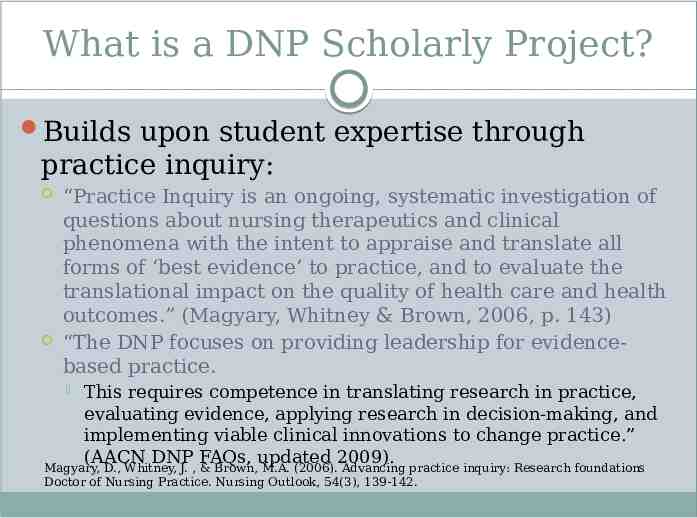
Areas of DNP Practice Inquiry DNP practitioner focus Translational science Program evaluation Practice change (improvement) programs Quality improvement Translating evidence to clinical practice AACN DNP Task Force, 2006. Brown, M. A. (2011). Advancing Practice Through the DNP Capstone [PowerPoint]. Washington, Source: AACN. DNP Implementation Task Force http://www.aacn.nche.edu/aacn-publications/whiteD.C.: AACN papers/DNP-Implementation-TF-Report-8-15.pdf

Scholarly Project Deliverables Demonstrates synthesis of the student’s work and lays the foundation for future scholarship Produces a tangible and deliverable academic product Derived from the practice immersion experience Documents outcomes of student’s educational experiences Provides a measurable medium for evaluating immersion experience Summarizes student’s growth in knowledge and expertise Brown, M. A. (2011). Advancing Practice Through the DNP Capstone [PowerPoint]. Washington, D.C.: AACN

Tips & Strategies Staying Motivated We all suffer from insecurity, anxiety, and even boredom Be realistic about what you can accomplish, and try to concentrate on giving yourself positive feedback for tasks you do complete, instead of negative feedback for those you don't
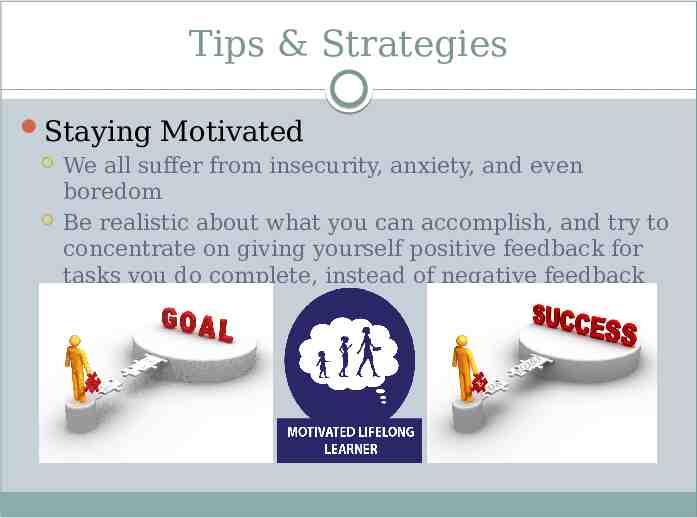
Tips & Strategies Time Management is Key Stay focused Organize activities to force you to manage your time and to do something every day Setting daily, weekly, and monthly goals Use a “buddy system” where you and another student meet/talk regularly Find people to work with
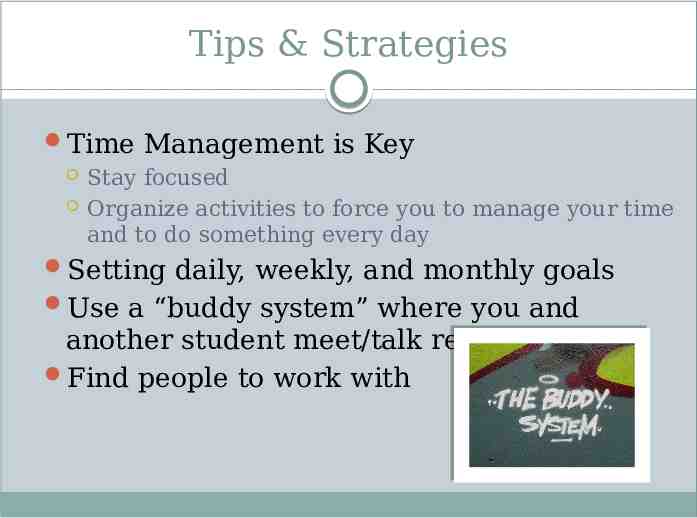
Tips & Strategies Allocate enough time to ‘decide’ on your topic Match your particular niche Decide on a topic which you already have some knowledge of or one you are ‘passionate’ about The topic should keep you motivated over a 2-year period
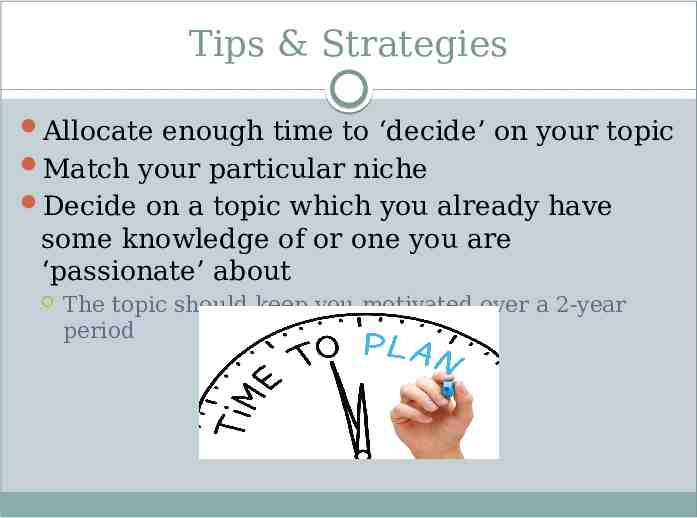
Organizing for Success Early Identification of Problem Turning preliminary thoughts into a scholarly concept Formulating a practice question Good questions cannot be posed without knowledge of what researchers already know What does the evidence say?
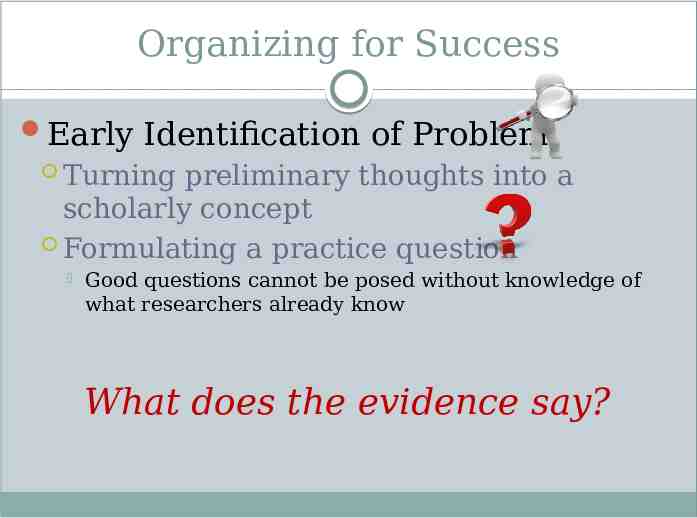
Organizing for Success Understand the Research Process ROL (critical /analytical appraisal of the theoretical/empirical literature) the first step in posing a question worth answering is reviewing the literature on the topic Methodology Findings/Results Summary/Conclusions Implications/Discussion
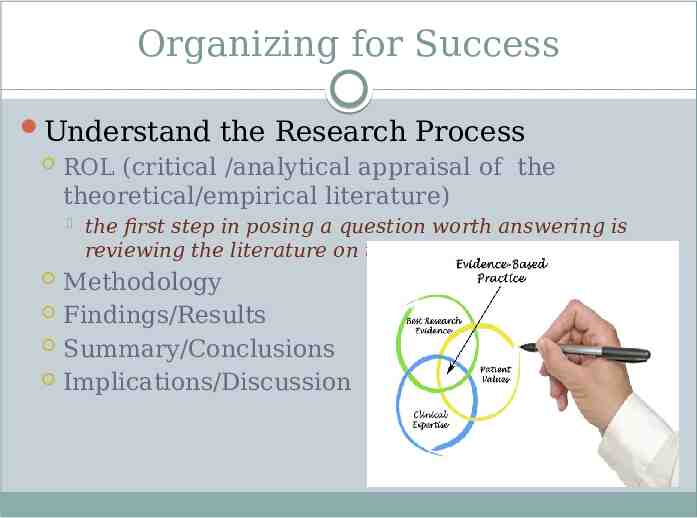
Organizing for Success Understand how a manuscript is written Basic format and writing style (APA) Written guidelines to supplement format (university specific) Length Expect numerous revisions to the DNP Scholarly Project
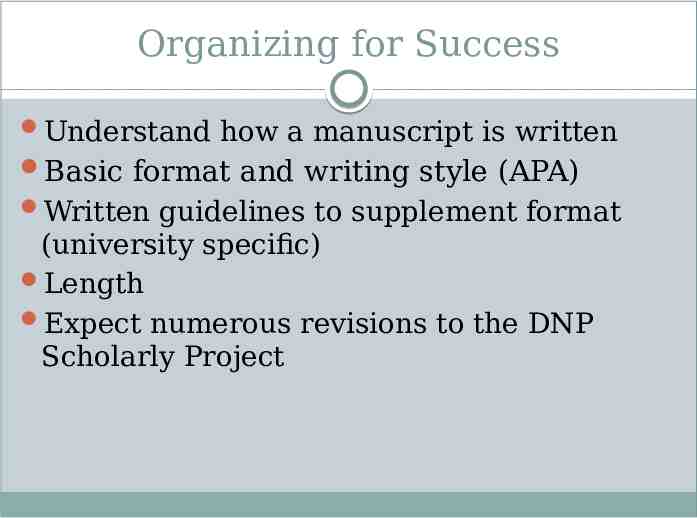
Organizing for Success Divide-and-conquer strategy on writing Breaking down any project into smaller pieces is always a good tactic when things seem unmanageable Instead of writing an entire manuscript, focus on the goal of writing a chapter, section, or outline Identify tasks that you can do in an hour or less; then you can come up with a realistic daily schedule
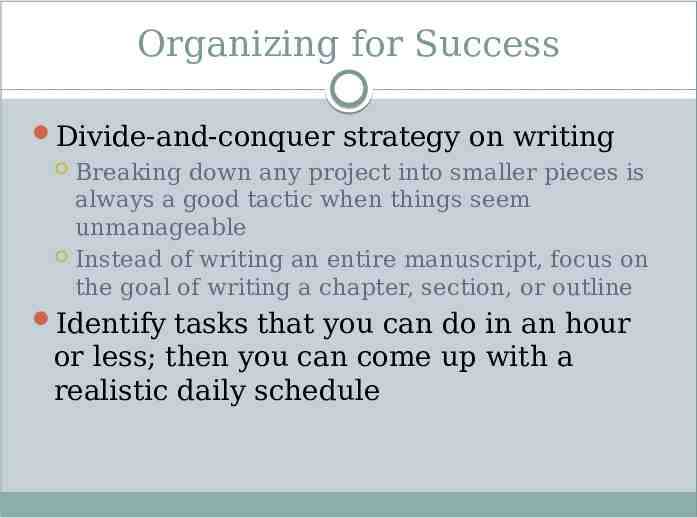
Organizing for Success Social & Academic Support Involve and use your mentors Discussions with your mentors help generate ideas for your DNP Scholarly Project and may steer you towards more interesting approaches Talk to your peers Engage the right resources Surround yourself with Positive People
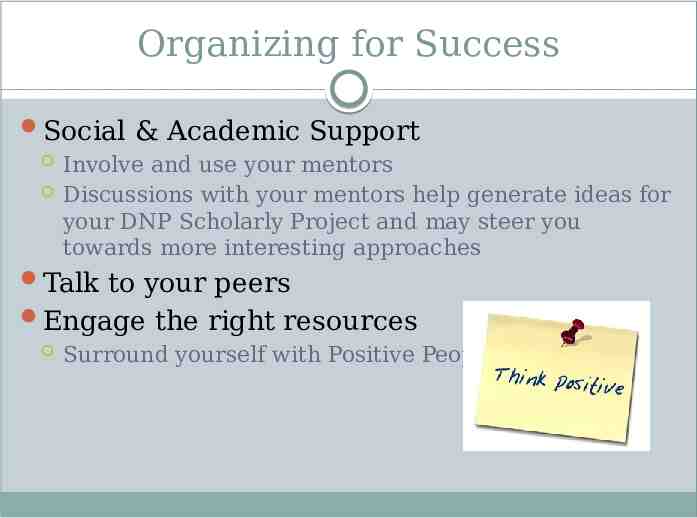
Organizing for Success Work with your DNP Project Team-Advisor Guides you to attain goals Schedule of tasks and accomplishments: prospectusproposal to final project Timetable of due dates IRB approval Seek their counsel to effective DNP Scholarly Project Help & advisement Use them to your advantage Understand students’, advisors’, and committee members’ responsibilities
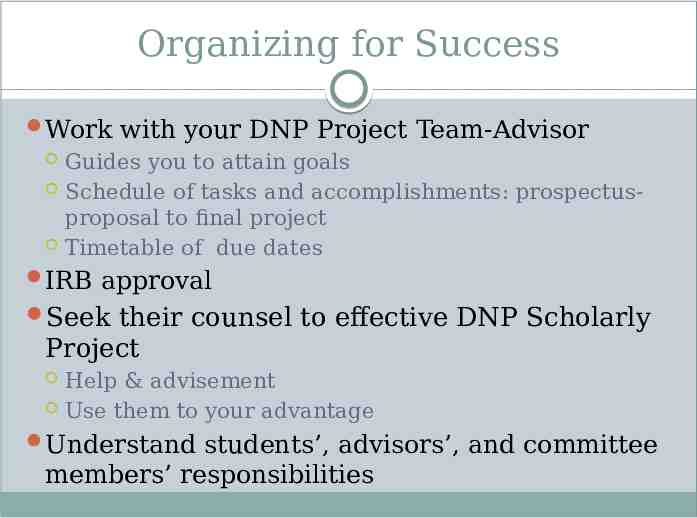
Remember Every task you complete gets you closer to the finish line
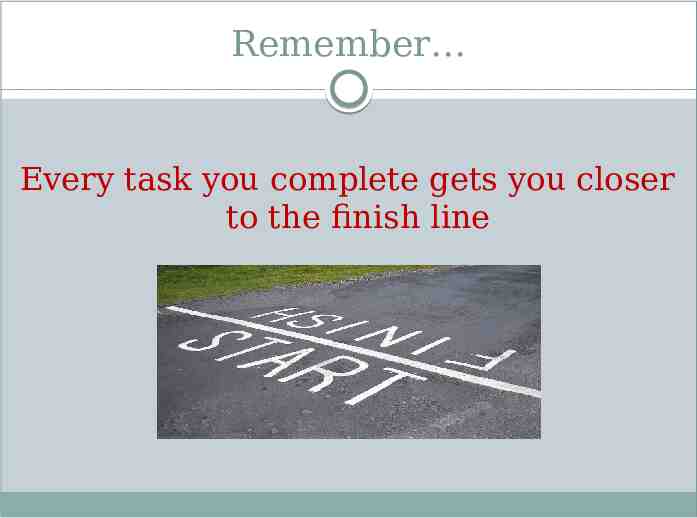
Recap Planning Structuring the DNP Scholarly Project Time Management Writing Staying Motivated Social & Academic Support Dissemination and Presentation
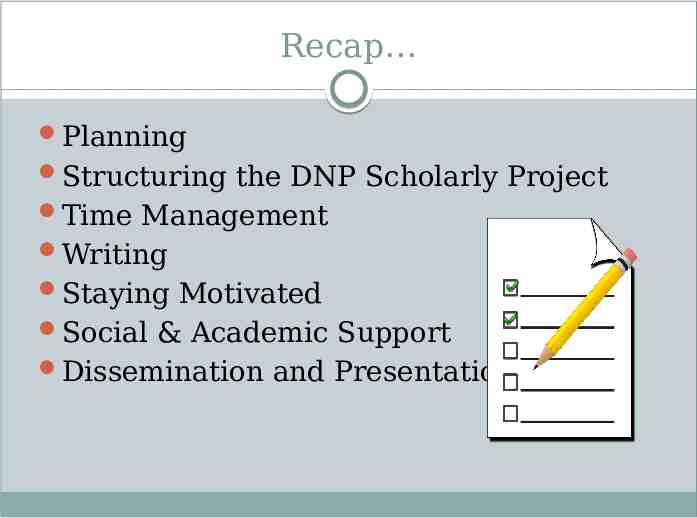
The Four Agreements, 1997 Be Impeccable With Your Word Don’t Take Anything Personally Don’t Make Any Assumptions Always Do Your Best

Final Thoughts . “love life, engage in it, give it all you've got. love it with a passion, because life truly does give back, many times over, what you put into it” Maya Angelou



